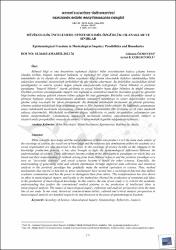| dc.contributor.author | Özmenteş, Gökmen | |
| dc.contributor.author | Çerezcioğlu, Aykut | |
| dc.date.accessioned | 2023-08-29T11:42:09Z | |
| dc.date.available | 2023-08-29T11:42:09Z | |
| dc.date.issued | 20.11.2022 | en_US |
| dc.identifier.citation | Özmenteş, G. & Çerezcioğlu, A. (2022). Müzikolojik İncelemede Epistemolojik Özgürlük: Olanaklar ve Sınırlar . Afyon Kocatepe Üniversitesi Akademik Müzik Araştırmaları Dergisi , CİLT VIII - ÖZEL SAYI , 371-400 . | en_US |
| dc.identifier.uri | https://dergipark.org.tr/tr/pub/amader/issue/74848/1169543 | |
| dc.identifier.uri | https://hdl.handle.net/11630/10357 | |
| dc.description.abstract | Bilimsel bilgi ve onu üretenlerin toplumsal ilişkileri bilim sosyolojisinin başlıca çalışma konusu olmakla birlikte, bilginin toplumsal kullanımı ve toplumsal bir örgüt olarak akademi içindeki ilişkiler ve tahakkümler de bu alanda ele alınır. Bilim sosyolojisi bilgi üretim sürecindeki ilişkilere odaklandıkça bilim anlayışları arasındaki epistemolojik farklılıkları da gün yüzüne çıkarmıştır. Bu farklılıklar yaslandıkları felsefi paradigmalar ve onların içinden doğan yöntem anlayışlarında belirginleşir. Tabiat bilimleri ve pozitivist paradigma “başarılı bilimler” olarak görülmüş ve sosyal bilimler başta diğer bilimlere de model olmuştur. Özellikle pozitivist paradigmadaki ampirik veri toplama ve istatistiksel analizler üzerinden geçerli ve güvenilir bilgi üretme anlayışı giderek yöntemi bilime eşdeğer bir hale getirmiştir. Böylelikle verili düzenekler olarak iş görmeye başlayan yöntem mekanizmaları akademik cemaatleri tanımlayan ve onları diğerlerinden ayırma gücüne sahip sosyolojik bir işleve dönüşmüştür. Bu dönüşüm müzikolojik incelemede de etkisini göstermiş, yönteme sadakat müzikolojik bilgi üretiminde yorum ve fikir üretimini bloke etmiştir. Bu bağlamda çalışmamızın amacı müzikolojik incelemede alışılagelmiş yöntem kalıplarını entelektüel fikir üretimine tercih eden akademik anlayışı eleştirmektir. Müzikolojik incelemenin doğası, refleksivite ve analiz perspektifleri çalışmamızın ana hattını oluşturmaktadır. Çalışmamızda müzikolojik incelemede tarihsel, yapısal/materyalistik, kültürel ve eleştirel analiz perspektifleri sırasıyla ele alınmış ve epistemolojik özgürlük odağında tartışılmıştır. | en_US |
| dc.description.abstract | While scientific knowledge and the social relations of those who produce it are the main study subject of the sociology of science, the social use of knowledge and the relations and dominations within the academy as a social organization are also discussed in this field. As the sociology of science focuses on the relations in the knowledge production process, it has also brought to light the epistemological differences between the understandings of science. These differences become evident in the philosophical paradigms on which they are based and their understanding of methods arising from them. Natural sciences and the positivist paradigm were seen as “successful sciences” and social sciences became a model for other sciences. Especially, the understanding of generating valid and reliable information through empirical data collection and statistical analysis in the positivist paradigm has gradually made the method equivalent to science. Thus, method mechanisms that started to function as given mechanisms have turned into a sociological function that defines academic communities and has the power to distinguish them from others. This transformation has also shown its effect in musicological inquiry, and loyalty to the method has blocked the production of comments and ideas in the production of musicological knowledge. In this context, the aim of our study is to criticize the academic understanding that prefers the conventional method patterns to the production of intellectual ideas in musicological analysis. The nature of musicological inquiry, reflexivity and analysis perspectives form the main line of our study. In our study, historical, structural/materialistic, cultural and critical analysis perspectives in musicological analysis are handled respectively and discussed in the focus of epistemological freedom. | en_US |
| dc.language.iso | tur | en_US |
| dc.publisher | Afyon Kocatepe Üniversitesi | en_US |
| dc.identifier.doi | 10.36442/AMADER.2022.76 | en_US |
| dc.rights | info:eu-repo/semantics/openAccess | en_US |
| dc.subject | Sociology of Science | en_US |
| dc.subject | Musicological Inquiry | en_US |
| dc.subject | Epistemology | en_US |
| dc.subject | Reflexivity | en_US |
| dc.subject | Analysis | en_US |
| dc.subject | Bilim Sosyolojisi | en_US |
| dc.subject | Müzik İncelemesi | en_US |
| dc.subject | Epistemoloji | en_US |
| dc.subject | Refleksivite | en_US |
| dc.subject | Analiz | en_US |
| dc.title | Müzikolojik incelemede epistemolojik özgürlük: Olanaklar ve sınırlar | en_US |
| dc.title.alternative | Epistemological freedom in musicological inquiry: Possibilities and boundaries | en_US |
| dc.type | article | en_US |
| dc.relation.journal | Afyon Kocatepe Üniversitesi Akademik Müzik Araştırmaları Dergisi | en_US |
| dc.department | Afyon Kocatepe Üniversitesi | en_US |
| dc.authorid | 0000-0003-0546-3939 | en_US |
| dc.authorid | 0000-0003-4558-8154 | en_US |
| dc.identifier.volume | 8 | en_US |
| dc.identifier.startpage | 371 | en_US |
| dc.identifier.endpage | 400 | en_US |
| dc.identifier.issue | Özel Sayı | en_US |
| dc.relation.publicationcategory | Makale - Ulusal Hakemli Dergi - Başka Kurum Yazarı | en_US |



















